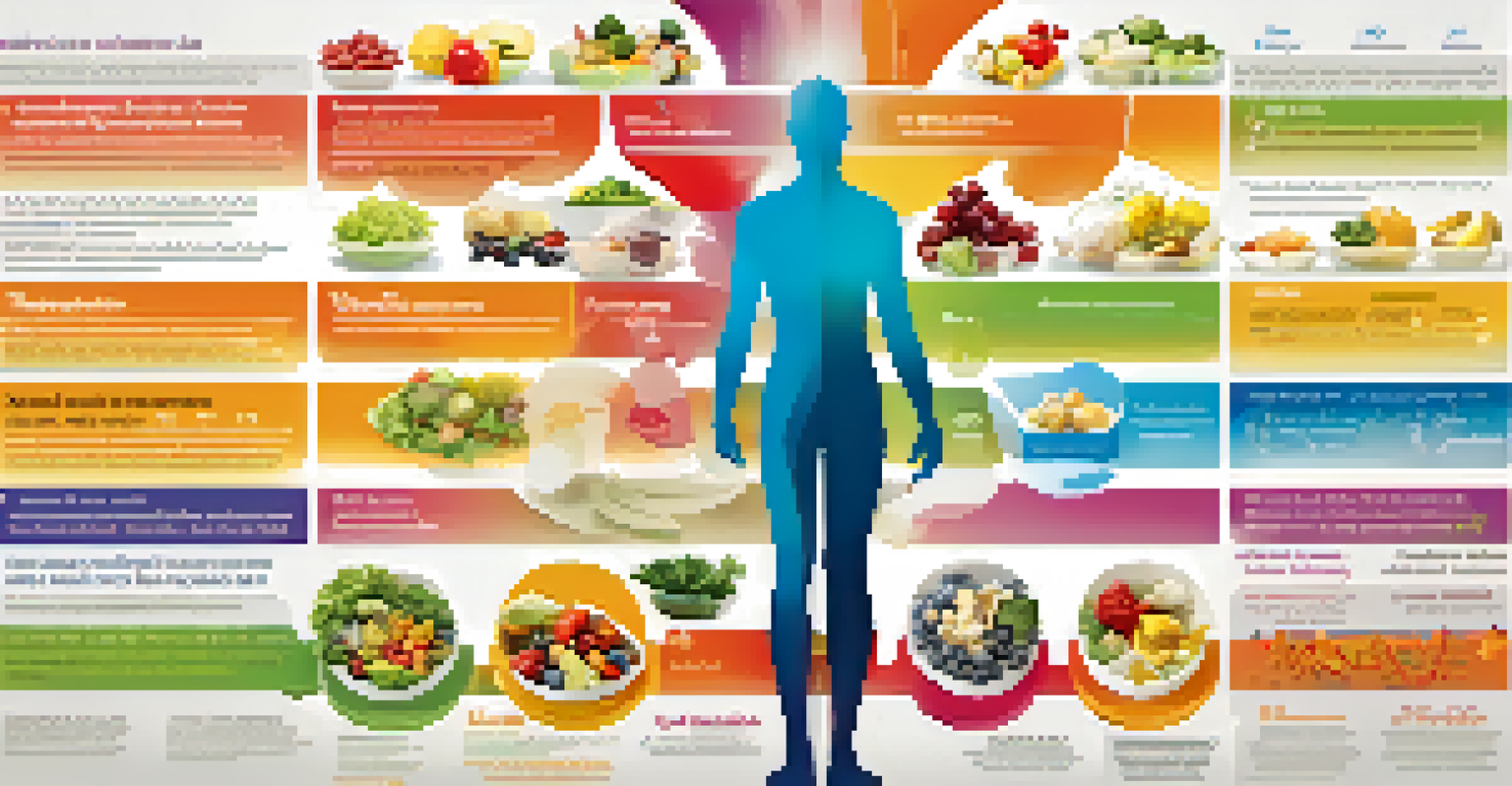Nutrigenomics Research: Key Studies and Findings Explained

Understanding Nutrigenomics: A Brief Overview
Nutrigenomics is the study of how our genes interact with the food we eat. It delves into the ways our genetic makeup affects our nutritional needs and how diet can influence gene expression. This field is rapidly evolving, focusing on personalized nutrition to optimize health based on individual genetic profiles.
Genetics loads the gun, but environment pulls the trigger.
Imagine your body as a finely-tuned machine where each part requires specific fuel to run efficiently. Just like the right oil can enhance a car’s performance, the right nutrients can influence our genes and overall health. Nutrigenomics aims to identify this perfect match between diet and genetic predisposition.
By understanding these interactions, we can make informed dietary choices that may prevent diseases and promote well-being. This personalized approach marks a significant shift from the one-size-fits-all nutrition advice we've often encountered.
Key Studies: The Pioneers of Nutrigenomics
Several landmark studies have paved the way for advances in nutrigenomics. One notable study published in the journal 'Nature' examined how specific nutrients affect gene regulation and expression. Researchers found that dietary components, like omega-3 fatty acids, could turn on genes that protect against inflammation.

Another significant study explored the impact of folate on gene expression related to cancer risk. Participants with certain genetic variants showed that adequate folate intake could lower their risk of developing colorectal cancer. This research illustrates the delicate dance between our diet and genetic predisposition.
Nutrigenomics Tailors Nutrition
Nutrigenomics focuses on how our genes interact with food, allowing for personalized dietary choices that align with individual genetic profiles.
These studies are just the tip of the iceberg, highlighting the potential of tailored nutrition. As research continues, we are beginning to see the power of diet not just as fuel, but as a means of influencing our genetic destiny.
The Role of Personalized Nutrition in Health
Personalized nutrition is at the heart of nutrigenomics, helping individuals make dietary choices that specifically cater to their genetic profiles. Instead of relying on generic dietary guidelines, people can receive tailored recommendations based on their unique genetic makeup. This customization can lead to better health outcomes and enhanced performance.
Let food be thy medicine and medicine be thy food.
For instance, individuals with a genetic predisposition to lactose intolerance can benefit from a dairy-free diet, while those with specific gene variants might thrive on higher carbohydrate intake. By aligning diet with genetic needs, we can optimize health and reduce the risk of chronic diseases.
The shift towards personalized nutrition not only empowers individuals but also emphasizes the importance of understanding our bodies. Knowledge of our genetic profiles can transform how we view food, enabling us to make choices that are truly beneficial for our health.
Nutrigenomics and Chronic Disease Prevention
Chronic diseases like diabetes, heart disease, and obesity are on the rise, and nutrigenomics offers promising strategies for prevention. Research indicates that certain dietary patterns can mitigate genetic risks associated with these conditions. For example, a diet rich in antioxidants may help protect against oxidative stress linked to cardiovascular diseases.
Moreover, studies have shown that individuals with specific genetic markers can significantly benefit from increased physical activity combined with a tailored diet. This points to the potential of nutrigenomics in creating comprehensive health plans that encompass both nutrition and lifestyle choices.
Chronic Disease Prevention Strategies
This field offers promising strategies for preventing chronic diseases by tailoring diets to mitigate genetic risks.
By understanding the genetic factors at play, we can develop targeted dietary interventions that not only address existing health issues but also prevent future complications. This proactive approach is vital in combating the growing epidemic of chronic diseases in our society.
Emerging Trends in Nutrigenomics Research
As the field of nutrigenomics continues to expand, several trends are emerging that promise to shape its future. One such trend is the use of advanced technologies like genomics and metabolomics, which analyze the complex interactions between diet, genes, and metabolic processes. These technologies offer deeper insights into how our bodies respond to various nutrients.
Another exciting development is the integration of nutrigenomics into public health initiatives. By promoting awareness of genetic factors in nutrition, health organizations can encourage healthier eating habits at the population level. This could lead to significant improvements in public health outcomes.
Additionally, the rise of personalized supplements and nutraceuticals tailored to individual genetic profiles is gaining traction. These products aim to provide the right nutrients needed for optimal health, marking a new frontier in the world of nutrition.
Real-Life Applications of Nutrigenomics
Nutrigenomics isn't just a theoretical concept; it's already being applied in real-world settings. Many health professionals are beginning to incorporate genetic testing into their practice, allowing them to offer personalized dietary advice. This practical application can lead to more effective health management for patients.
For example, individuals with a genetic predisposition to high cholesterol may receive customized meal plans focusing on heart-healthy foods. This targeted approach not only helps manage their condition but can also empower them to take control of their health journey.
Emerging Trends in Nutrigenomics
Advancements such as genomics and personalized supplements are shaping the future of nutrigenomics and enhancing public health initiatives.
Moreover, companies are developing apps and tools that provide personalized nutrition recommendations based on genetic data. These innovations make it easier for people to embrace dietary changes aligned with their genetic needs, fostering a more health-conscious society.
Challenges and Considerations in Nutrigenomics
Despite its potential, nutrigenomics faces several challenges that need to be addressed. One major concern is the accessibility of genetic testing for the general population. Currently, these tests can be expensive and may not be covered by insurance, limiting access for many individuals who could benefit from personalized nutrition.
Additionally, the interpretation of genetic data can be complex. Without proper guidance from qualified professionals, individuals may misinterpret their results, leading to misguided dietary choices. It's crucial to ensure that accurate information is readily available to support informed decision-making.

Lastly, ethical considerations surrounding genetic privacy and data security must be prioritized as the industry grows. It's essential to build trust and transparency in how genetic information is used, ensuring that individuals feel safe and informed about their health choices.